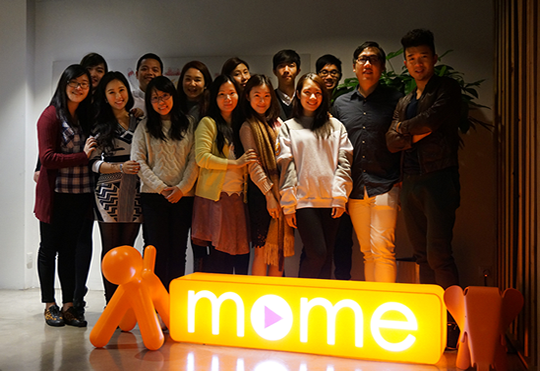![]()

 |
 |
 |
 |
 |
Go expressive, go
derivative
By G-mi K.

In a
vibrant, creative city, whenever there is a hot topic, popular story or figure,
various forms of related cultural contents, such as text, image, video and
music contents, etc., are produced by media and individuals. Some are
completely original works, while some are derived from existing works. The
latter are called derivative works or re-creations.
From east to
west, from shore to shore, derivative works encompass many different art forms.
“L.H.O.O.Q.”, a reproduction of the painting “Mona Lisa” by Marcel Duchamp in
1919, is an earliest example of derivative works. “Hitler Rants” parodies from
the film “Downfall”, produced by global Internet users in recent years, are
also derivative works; If we look locally, we may see
two typical re-creators in the region: Mome TV and Cuson Lo.
Unique way of expression
MOME, a
Macao-based media and marketing firm, produces and broadcasts videos and on the
notable TV channels it owns on public transport, public places and the
Internet. Among all program series made by its experienced, multidisciplinary
production team, “Micropedia” is known for featuring
elements derived from games, films, cartoons and other characters.
Brilliant
re-creations based on existing ideas, give life to a well-known, evergreen
show, while before all, as MOME’s Project and Creative Manager Kwok Hung
admitted, in the beginning, doing re-creations in this series was due to
practical consideration.
In each
episode, life secrets and tips are introduced. Kwok believed they are actually
simple, and can be expressed in a picture or a piece of paper, “but no one is
interested in this way,” he said.
Instead, his
team wants to deliver contents to their audience effectively. “If we simply
find an expert, let him/her speak and add the intelligent ‘ding’ sounds in the
show, audience may get bored,” said Kwok, adding, “Adapting the idea of
derivative works makes the show more entertaining, and keeps it fresh.”
Being solely
used in “Micropedia”, the derivative work is not
MOME’s main focus - as it mostly makes original works. Yet, Kwok mentioned its
benefit, “Characters are ready-made, with distinctive characteristics and maybe
counterparts, which audience are familiar with.”
On the other
hand, Cuson Lo Chi Kong, an advertising illustrator
and cartoonist in Hong Kong, does not re-create using scripts, cameras and
acting, but pens, papers and computers. Being one of the city’s most active
cartoonists supporting derivative works, he draws about hot issues, current
affairs and popular cultures, mainly featuring famous people, celebrities,
characters and scenes from mass media.
Being
sensitive to surroundings, Lo finds it efficient to express meanings, encourage
audience to think and interact with each other through re-creations. “Besides
entertaining, I wish my drawings give readers significant impacts, so that they
can think, criticize and share their views,” he said. “Derivative works give
some people a popularized approach to understand society and current issues.”
Lo
introduced that most ideas and elements used in re-creations come from life.
“Even watching an ordinary TV news report can give me good inspiration, for
example, to satirize the struggling but ‘never-dying’ ATV .” ATV was a Hong Kong TV station which ended broadcasting in April 2016.
Enjoying the outcomes
Kwok said,
“Process is always bitter, but our enjoyment is from outcome.” From creating
ideas, preparing costumes and props to doing makeups, he saw the crew members’
enthusiasm to re-create products or characters.
“Creativity
is brought by love [towards originals]. This is the core concept of derivative
works,” Kwok added. “Love is contributed to re-creations. Unlike copying, we
felt satisfied while doing re-creations.”
Apart from
entertaining audience, Kwok agreed that derivative works help them generate
messages to the public. He said, “People and the community determine impacts.
Knowing the constraints on re-creation, the derivative work is, anyway, a form
of creation easily accessible to many producers, and highly recognized by
audience.”
Lo also
enjoys making his derivative works. He said, “Re-creating is an interesting
job. Putting my ideas onto comic strips, get them published and I will see the
public’s reactions, whether they agree, disagree or have different comments.
This is so meaningful to me. The works may play an important role in social
interactions.”
Re-creation is a proper work
Some people
around the world criticized that derivative works are a beautified name for
piracy, while Kwok and Lo disagreed. “Copyright is copyright. It shall be
recognized by productions teams of all sizes and all types,” Kwok said. “We
imitate actual or virtual characters, scenes created by others in the series,
but we never plagiarize.”
Similarly,
Lo does not think derivative works are equal to copyright infringements. He
said, “I would rather think they [derivative works] help promote the contents
they are derived from.”
When asked
about future, Kwok pointed out that re-creating rights would not be a big issue
in Macao, due to the territory’s relatively small and new creative industry.
Regardless, he encouraged those who have passion to contribute more creative
cultural products to the local community.
Lo
explained, “Killing derivative works means killing creativity.” He hoped
society would treasure the dynamic creative industry and encourage its
development. “Here we are full of possibilities,” he said, “especially on
social media platforms, no matter whether you are doing sound, video or graphic
productions.”